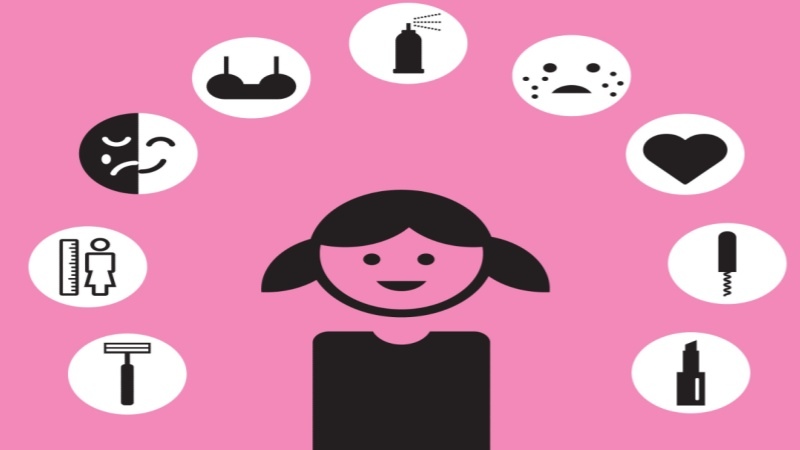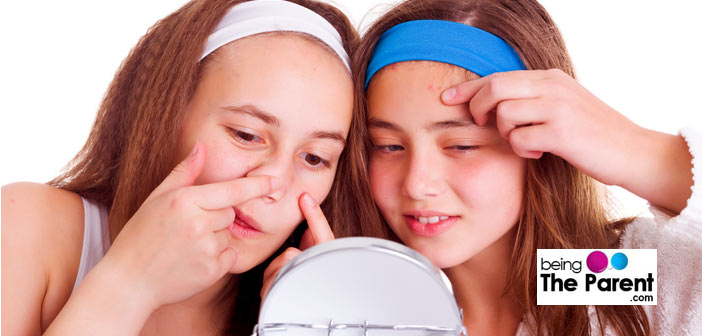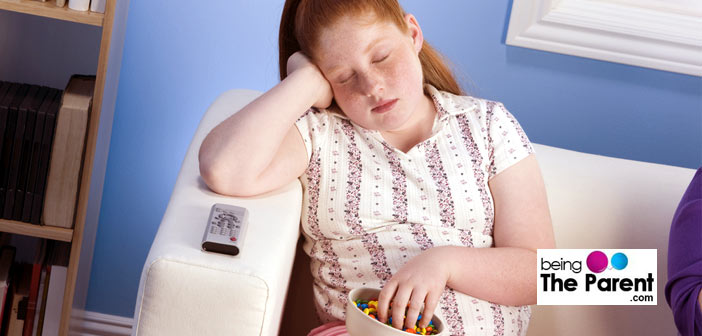
Unlike many other child milestones, your little girl’s puberty is a big defining moment for you as a parent as well. It is not just another tick in the checklist – your baby is transforming into a woman, and this raises your feeling of responsibility towards her by several notches. Find out everything about Early Puberty In Girls – Signs, Causes, Effects and Risks
While many cultures in India celebrate a girl coming of age, it freaks out a good many of us modern parents. Are you worried it is happening too soon? Do you feel that your child is too small to deal with the physical and psychological changes? Want to know about Early Puberty In Girls – Signs, Causes, Effects and Risks? Read on to understand if your child is showing symptoms of early puberty or if she is showing signs that are normal for girls of her age.
- What Is Early Puberty?
- Signs And Symptoms Of Early Puberty
- Causes Of Early Puberty In Girls
- Is My Daughter At Risk Of An Early Puberty?
- Can I Prevent Early Puberty In My Daughter?
- Consequences Of Early Puberty On Children
- Diagnosis And Treatment Of Early Puberty
- Is Treatment Required For Early Puberty?
- Your Role As A Parent
What Is Early Puberty?
Girls usually attain puberty between their 9th and 14th birthdays. Off late, researches have revealed that girls have been entering puberty at an earlier age, some even as young as 7, and this trend is a worrying factor for all parents.
One common misconception is associating puberty with the beginning of menstruation. This is not right. Puberty is the phase during which children (or adolescents) reach sexual maturity. Actual menstruation usually happens 1.5 to 3 years after the child starts to show initial signs of puberty. So if your 9-year-old has begun developing breasts, this is not early puberty.
However, if signs of puberty begin before the age of 7 or 8, then it is considered to be early puberty or precocious puberty. This is relatively rare – only 1 in 5000 girls are affected. But it can be a challenging period for your child – both emotionally and physically. Hence, it is important that as parents, we do not go into denial and brush off these symptoms as it is ‘too soon to hit puberty.’
Early puberty hits boys as well, but girls have been found more prone to hit early puberty than boys.
Signs And Symptoms Of Early Puberty
The signs of early puberty are mostly similar to the signs of normal puberty – it just appears earlier than usual.
1. Development of breasts:
This is often the first sign of puberty. However, there are two disclaimers here:
-
- At times, you might be mistaking the storage of excess fat under the nipple area as breasts. While your doctor should examine it, if your child is experiencing pain or tenderness around the area, it is usually breast formation and not fat
- >’Premature thelarche’ is a condition that leads to early breast development. This is not a sign of early puberty and usually resolves on its own without any medication. Again, ensure that a doctor examines your child and the condition monitoring
2. The appearance of hair in pubic and underarm region:
Just like breast development, pubic and underarm hair can also appear because of a condition called ‘premature pubarche.’ Again, this is not a sign of early puberty. But this needs to be examined by the doctor as it can indicate the presence of excess adrenal hormones
3. Acne:
Sebaceous gland starts to generate more sebum as the puberty sets in. Acne happens because of overactive oil glands
4. Adult body odor:
Sweat glands acts more as puberty sets in. This happens because of overactive sweat glands
5. Moodiness:
While it is difficult to determine if moodiness and puberty are related for smaller kids, one of the early signs of puberty includes irritability and moodiness in children
6. Growth spurts:
The child might grow several inches in height and become taller than most of her classmates. They might also undergo other physical changes like wider hips and narrower waists
7. Vaginal discharge:
Girls may complain of discharge from the vagina that is mucous-like and yellow or white in color

If you notice more than three of the above signs in your girl, we recommend you to take her to a doctor. This is because a doctor can best determine if these symptoms are normal or if your child requires any medical intervention. Find out fifteen things you should tell your daughter before she hits teenage.
Causes Of Early Puberty In Girls
For a normal, healthy girl, the puberty phase begins when the pituitary gland starts to produce a hormone called gonadotropins (Gn-RH). Gn-RH, in turn, triggers the production of estrogen by the ovaries and luteinizing hormone (LH) and follicle-stimulating hormone (FSH) by the pituitary gland. All these hormones appears at the beginning of puberty, and your child will show many of the signs like breast development explained in the previous section. While in most cases, early puberty does not impact the health of the child, in certain cases, it points towards an underlying medical condition. So it is important to determine the cause of your child’s early puberty.
In the case of early puberty, these hormonal triggers happen earlier than what is considered normal. Depending on this cause, early puberty is divided into two types:
1. Central precocious puberty:
This is the most commonly seen type of early puberty, where the pituitary gland starts producing Gn-RH too soon. This progresses as normal puberty – the only factor is it starts earlier. In most of the cases, the reasons for this early hormonal trigger is not known, but there are usually no underlying medical conditions. In rare cases though, it can be caused because of:
-
- A defect in the brain or spine, such as a tumor, injury and excess fluid build-up
- Hypothyroidism
- McCune-Albright syndrome and Congenital adrenal hyperplasia, which are genetic conditions that can lead to hormonal imbalances
2. Peripheral precocious puberty:
In this case, ovaries start producing estrogen without the trigger of Gn-RH from the pituitary gland. In other words, the body produces sex hormones without the brain, triggering it to do so. This usually happens due to problems in ovaries, adrenal glands or pituitary glands and requires further investigation by the doctor. Some of the causes are:
- Ovarian cysts or tumors
- McCune-Albright syndrome
- Exposure to sex hormones like estrogen from some creams or ointments used by adults
- Tumor in adrenal or pituitary glands
While most of the causes mentioned above sound scary, please understand that they appear in only rare cases, and your child is most likely healthy with no medical problems.
Is My Daughter At Risk Of An Early Puberty?
That said, certain risk factors might increase your child’s probability of getting early puberty. These are:
1. Obesity:
Overweight or obese girls are more likely to develop early signs of puberty. The Gn-RH hormone not only gets triggered by the ovaries but also from the fat deposits in the body. This is one of the major causes of early puberty in girls
2. Exposure to sex hormones:
If your child has come in contact with creams or ointments that contain estrogen, this again increases her chances of early puberty. Many unconfirmed reports link consumption of hormone-injected meat like chicken that acts as catalysts for puberty in kids
3. Exposure to radiation:
If your child has received radiation treatments to cure the tumor or other conditions early in life, this can also increase early puberty chances

Can I Prevent Early Puberty In My Daughter?
In cases where an underlying medical condition does not trigger early puberty, you can reduce your girl’s chances of getting early puberty by:
- Ensuring your child has a healthy weight and healthy eating habits
- Avoiding the exposure to sex hormones
- Help your daughter to have an enriching diet and exercise regularly
- New mothers must breastfeed, and breastfed children are more unlikely to hit early puberty
A healthy lifestyle needs to be taught early in life, and the benefits go a long way.
Consequences Of Early Puberty On Children
As mentioned above, in most early puberty cannot cause a medical or health problem. However, it can lead to:
1. Short Height:
While your girl might be taller than her peers during the initial phase of puberty due to growth spurts, she will stop growing once puberty stops. And in the case of early puberty, the phase would end sooner than normal poverty. This can lead to shorter height and stature
2. Emotional Impact:
Puberty, as such, is a confusing time, even when it occurs on a 12-year-old. When it happens earlier, your child is all the more unprepared for the changes that are happening to her. This can lead to different emotional problems like stress, self-consciousness, and depression
3. Social Teasing:
When a girl hit early puberty, she might be teased on enlarging breasts by her school mates or friends. This can have a major negative impact on the young mind, and she may withdraw her social life
Diagnosis And Treatment Of Early Puberty
Knowing everything about Early Puberty In Girls – Signs, Causes, Effects and Risks is important. Before the age of 7 or 8, if your daughter shows signs of sexual maturity, including breast development and menstruation, it could indicate early puberty. If you notice that your child is showing signs of early puberty, please take her to the doctor to:
- Rule out medical problems
- Suggest treatments if necessary
- Have peace of mind that what is happening to your daughter is in fact normal
The doctor might do a physical exam to confirm the signs you noticed and run blood tests to measure various hormonal levels. He may also check the structure of the bones to see if they are maturing rapidly. For ruling out other medical conditions, an MRI and thyroid test might also be recommended.
Is Treatment Required For Early Puberty?
In most cases, no treatment is necessary.
However, if you and your doctor decide that medical intervention is required, it could be one of the below:
- For central precocious puberty, Gn-RH analog therapy might be advised that further development of Gn-RH hormone
- If an underlying medical condition is resulting in puberty, treatments for rectifying that condition would generally result in early puberty resolving on its own
Your Role As A Parent
Your daughter showing signs of puberty at a very young age, can be very emotionally demanding for you as a parent. But more so for your daughter. It is important to understand that your child might be considering puberty as perhaps her first physical and emotional trauma. You can help her by:
- Helping her understand puberty in clear, simple and truthful ways
- Explaining to her that it is entirely normal and most of her friends would reach this point soon; she just started earlier than them
- Giving her a heads-up about what to expect in the coming months and years
- Watching her for signs of behavioral problems or depression
- Taking help of a counselor for yourself and your daughter, if need be
- Introducing her to products like bras and deodorants and helping her with her acne problems
- Ensuring a healthy and motivated environment at home
Hope the article on Early Puberty In Girls – Signs, Causes, Effects and Risks is helpful. If you want your child to cope with the situation in a positive way, you will have to do this first. You must ensure that you do not comment on your child’s appearance, instead focus on things that she is doing well. You will need to maintain a supportive environment so that your child does not sink into depression or lower self-esteem. Carefully watch out for any signs of teasing or other social difficulties that your child might be facing.


1 Comment
Thank you for sharing this article! It’s so important that parents are prepared for this eventuality with their daughters. I think the prevalence of endocrine disruptors in SO many products and plastics can be contributing to this as well. It’s a little scary how young this can start. I’m thankful that my youngest is nearly 11 and still waiting, and my eldest didn’t get her until 11 either. They both have learning disabilities and teaching about this area can be challenging, but “be a parent first”, right? I’m fortunate that so far, my kids have understood what I taught them and appear to be handling it all well. Hope it continues that way.